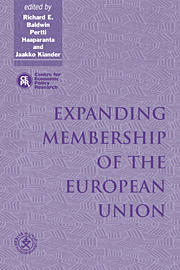Book contents
- Frontmatter
- Contents
- List of figures
- List of tables
- Preface
- Acknowledgements
- List of conference participants
- 1 Introduction
- PART ONE THEORETICAL ISSUES
- 2 A domino theory of regionalism
- 3 Customs unions, regional trading blocs and welfare
- 4 Consumer services and economic integration
- PART TWO POLICY ISSUES
- PART THREE EMPIRICAL ISSUES
- Index
3 - Customs unions, regional trading blocs and welfare
Published online by Cambridge University Press: 05 November 2011
- Frontmatter
- Contents
- List of figures
- List of tables
- Preface
- Acknowledgements
- List of conference participants
- 1 Introduction
- PART ONE THEORETICAL ISSUES
- 2 A domino theory of regionalism
- 3 Customs unions, regional trading blocs and welfare
- 4 Consumer services and economic integration
- PART TWO POLICY ISSUES
- PART THREE EMPIRICAL ISSUES
- Index
Summary
Introduction
There are some indications today that the multilateral trading system is yielding to, or is complemented by, a system of regional trading arrangements. The Uruguay Round of multilateral trade negotiations was long overdue, and the big players with the power to resolve the deadlock, the EU and the US, seemed more interested in their own regional integration initiatives than in furthering the process of multilateral trade liberalisation. The foot-dragging at the negotiation table was surely strategic to some extent – a manoeuvre to get additional concessions from the more eager parties – but it may also have reflected a more negative attitude or disillusionment with the GATT-centred multilateral trading system. Indeed, while GATT has been effective in reducing tariffs since the Second World War, it has encountered increasing difficulties in stemming the proliferation of non-tariff trade barriers and in extending the coverage to new areas, such as services, agricultural products and protection of intellectual property rights.
In the view of many observers, the EU has become increasingly inward-looking as it has grown larger, and there are widespread concerns that the more protectionist-inclined members will dominate the policy process and turn the EU into a ‘European Fortress’, an increasingly closed market to the rest of the world. The direction of US trade policy is also unclear. Advocators of (aggressive) bilateralism seem to have won ground, fuelled by the perception that the Japanese market is ‘closed’ and that other nations do not play by the GATT rules.
- Type
- Chapter
- Information
- Expanding Membership of the European Union , pp. 54 - 79Publisher: Cambridge University PressPrint publication year: 1995
- 3
- Cited by



